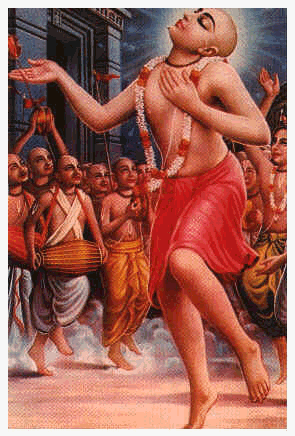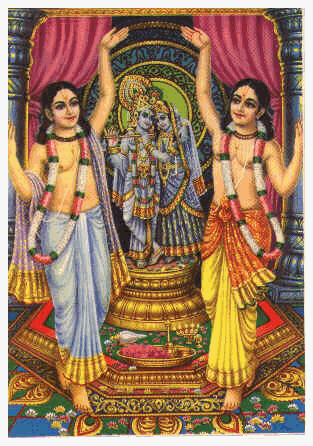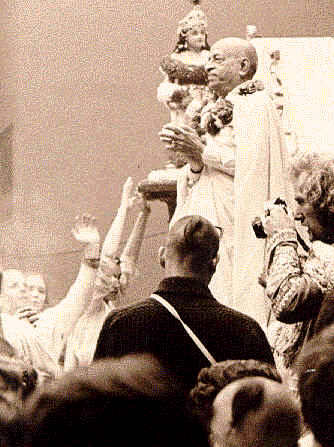 
Lord Caitanya Mahaprabhu who appeared 500 years ago
in Navadvip west Bengal
Caitanya
In the late sixteenth century, with the advent of Krishna
Caitanya, in Bengal, Ramanuja's and Madhva's theistic philosophy of Vaisnavism (worship of
Vishnu, or Bhagavan) reached its climax. Caitanya's philosophy of acintya-bhedabheda-tattva
completed the progression to devotional theism. Ramanuja had agreed with Sankara that
the Absolute is one only, but he had disagreed by affirming individual variety within that
oneness. Madhva had underscored the eternal duality of the Supreme and the jiva: he
had maintained that this duality endures even after liberation. Caitanya, in turn,
specified that the Supreme and the jivas are 'inconceivably, simultaneously one and
different" (acintya-bhedabheda). He strongly opposed Sankara's philosophy for
its defiance of Vyasadeva's siddhanta.
In rejecting impersonalism, Caitanya said that it clouds the
Vedic literature's meaning. He explained the direct meaning of the sastras as
devotion (bhakti) to Bhagavan Krishna. Thus, Caitanya made an unprecedented
contribution. Here was the possibility of a devotional relationship between God and man.
Rupa Gosvami, an early disciple,. described Caitanya's unique gift: "O most
munificent incarnation! You are Krishna Himself appearing as Sri Krishna Caitanya
Mahaprabhu.... You are widely distributing pure love of Krishna. We offer our respectful
obeisances unto you."
We know more about Krishna Caitanya than about the earlier acaryas,
banks to such biographical sources as Sri Caitanya-caritamrta AD.1616), by
Krsnadasa Kaviraja Gosvami. Caitanya (AD. 1486-1534) was born in Navadvipa, Bengal. He
took the renounced order (sannyasa) at the age of twenty-four. His spiritual
master, Isvara Puri, was a disciple of Madhavendra Puri, who came in the line of Madhva.
Caitanya's immediate followers (the six Gosvamis: Rupa, Sanatana, Jiva, Gopala Bhatta,
Raghunatha Bhatta and Raghunatha dasa) compiled extensive Sanskrit literatures and thus
documented Caitanya's philosophical system according to Vedic evidence. Himself, Caitanya
wrote only eight verses, on the ecstasy of devotion to Krishna. His disciples understood
Caitanya to be Bhagavan Krishna Himself appearing in the form of a devotee.
Some observers have charged Caitanya with introducing an
erotic element into bhakti philosophy. What Caitanya actually taught was that the
original and pure sex psychology exists in the person of the Absolute Truth, Bhagavan
Krishna. The pure exchange of pleasure between the Supreme Bhagavan and His liberated
servitors is characteristic of the highest spiritual relationship. This exchange is not
tainted by mundane sex and cannot even be understood by a person still affected by
material desire. When conditioned jivas try to understand the loving affairs of Bhagavan
Krishna, they misconstrue Bhagavan Krishna as a mundane "god of love." Himself a
sannyasi noted for strict avoidance of women and worldly affairs, Caitanya pointed
out that the jiva's relationship with Bhagavan Krishna is eternally pure and
transcendental. His Personality demonstrated conjugal longing for Krishna. Further,
Caitanya taught that this conjugal mood is one of five original relationships between the jivas
and Bhagavan. Finally, in Caitanya's view anyone can attain transcendental devotion to
Bhagavan (God) if he absorbs himself in chanting Bhagavan's names. |
"The sankirtana movement went on
from one part of the town to another, as the Lord wandered everywhere performing kirtana.
In this way He inundated the whole world by distributing love of Godhead."
 (Caitanya-caritamrita, Adi 13.32) (Caitanya-caritamrita, Adi 13.32)

Prabhupada raises a doubt in his purport to this verse:
"How all three worlds became inundated with love of Krishna since Caitanya Mahaprabhu
performed kirtana only in the Navadvipa area? The answer is that Lord Sri Caitanya
Mahaprabhu is Krishna Himself. The entire cosmic manifestation results from the Lord's
first setting it in motion. Similarly the sankirtana movement was first set in
motion five hundred years ago by Sri Caitanya Mahaprabhu's desire.. ." It is a
physical law that what is once set in motion will continue to move. Lord Caitanya gave the
original push in Navadvipa, and that push has set the world-wide sankirtana movement
in motion. ISKCON and many others are continuing the momentum of Lord Caitanya's original push.
 KRISHNA -- SUPREME CONTROLLER. Srila Prabhupada used
to say that we are all isvaras, controllers, to some extent. The President of the
United States is a big controller, a religious leader may control hundreds of followers, a
family man controls his wife, a yogi controls his senses, but only Krishna is the Supreme
Controller. KRISHNA -- SUPREME CONTROLLER. Srila Prabhupada used
to say that we are all isvaras, controllers, to some extent. The President of the
United States is a big controller, a religious leader may control hundreds of followers, a
family man controls his wife, a yogi controls his senses, but only Krishna is the Supreme
Controller.
 From the Brahma-samhita: isvarah paramah krsnah.,
sac-cid-ananda- vigrahah. From the Caitanya-caritamrta: ekale isvara krsna ara saba
bhritya. Only Krishna is the Supreme; all others are His servants. Krsnas tu bhagavan
svayam. From the Brahma-samhita: isvarah paramah krsnah.,
sac-cid-ananda- vigrahah. From the Caitanya-caritamrta: ekale isvara krsna ara saba
bhritya. Only Krishna is the Supreme; all others are His servants. Krsnas tu bhagavan
svayam.
 The two aspects of a controller are: (1) He is independent of
others' control; and (2) His orders cannot be neglected by others. Lord Krishna fulfills
both these criteria to an infinite degree. By His energy as Time, He controls all living
beings in the universe. "Time I am and I have come to engage everyone." Time
itself, as well as all subordinate gods and their cosmic operations, are all subject to
the will of the Supreme. "Simply by Your and by Your partial representation of
Vishnu, You are maintaining the universes. In this way, O Krishna, O enemy of Kamsa, there
are so many Brahmas and Sivas who are simply carrying out Your orders." (NOD, Chap.
22, p.183) The two aspects of a controller are: (1) He is independent of
others' control; and (2) His orders cannot be neglected by others. Lord Krishna fulfills
both these criteria to an infinite degree. By His energy as Time, He controls all living
beings in the universe. "Time I am and I have come to engage everyone." Time
itself, as well as all subordinate gods and their cosmic operations, are all subject to
the will of the Supreme. "Simply by Your and by Your partial representation of
Vishnu, You are maintaining the universes. In this way, O Krishna, O enemy of Kamsa, there
are so many Brahmas and Sivas who are simply carrying out Your orders." (NOD, Chap.
22, p.183)
 PREDICTIONS OF LORD CAITANYA PREDICTIONS OF LORD CAITANYA "Let
me offer my respectful obeisances to Sri Caitanya Mahaprabhu, by whose mercy even unclean yavanas
become perfectly well-bred gentlemen by chanting the holy name of the Lord. Such is the power of Lord
Sri Caitanya Mahaprabhu." (Adi 17.1) "Let
me offer my respectful obeisances to Sri Caitanya Mahaprabhu, by whose mercy even unclean yavanas
become perfectly well-bred gentlemen by chanting the holy name of the Lord. Such is the power of Lord
Sri Caitanya Mahaprabhu." (Adi 17.1)
Prabhupada writes in his purport:
 There is a persistent misunderstanding that one cannot become a brahmana unless
he changes his body. As we have discussed several times, it is to be understood that by
the supremely powerful potency of the Lord . . . everything is possible. Caitanya
Mahaprabhu is as fully independent as Krishna. . . . If He wants, by His mercy He can
convert even a yavana . . . into a perfectly well-behaved gentleman. This is
actually happening in our propagation of the Krishna consciousness movement. There is a persistent misunderstanding that one cannot become a brahmana unless
he changes his body. As we have discussed several times, it is to be understood that by
the supremely powerful potency of the Lord . . . everything is possible. Caitanya
Mahaprabhu is as fully independent as Krishna. . . . If He wants, by His mercy He can
convert even a yavana . . . into a perfectly well-behaved gentleman. This is
actually happening in our propagation of the Krishna consciousness movement.

Lord Caitanya and Lord Nityananda dancing in front of Sri Sri Radha
Krishna singing....

|
![]() Srila Prabhupada (founder of the Hare Krishna movement) was immersed in
chanting Hare Krishna, Hare Krishna, Hare Krishna, Krishna Krishna Hare Hare, Hare Rama
Hare Rama, Rama Rama, Hare Hare. Aware of the holy name's power, he was confident enough
to travel to America. He knew that although the Hare Krishna mantra would sound foreign to
Western ears, the holy name was so powerful that it 'could manifest in their heart's
regardless. By Srila Prabhupada's mercy, the powerful movement of chanting the holy names
is spreading to every town and village around the world.
Srila Prabhupada (founder of the Hare Krishna movement) was immersed in
chanting Hare Krishna, Hare Krishna, Hare Krishna, Krishna Krishna Hare Hare, Hare Rama
Hare Rama, Rama Rama, Hare Hare. Aware of the holy name's power, he was confident enough
to travel to America. He knew that although the Hare Krishna mantra would sound foreign to
Western ears, the holy name was so powerful that it 'could manifest in their heart's
regardless. By Srila Prabhupada's mercy, the powerful movement of chanting the holy names
is spreading to every town and village around the world.![]() The holy name's power is not yet fully unleashed in Kali-yuga.
People can see Krishna, if only they will take wholeheartedly to chanting. Those who are
already chanting can see the holy name's power in their lives. We can only hope that
society's leaders will discover the real universal power, and give up tinkering with their
electronic and atomic energie before they bring about major destruction. Spreading the
power of the holy name is the work of the Hare Krishna movement.
The holy name's power is not yet fully unleashed in Kali-yuga.
People can see Krishna, if only they will take wholeheartedly to chanting. Those who are
already chanting can see the holy name's power in their lives. We can only hope that
society's leaders will discover the real universal power, and give up tinkering with their
electronic and atomic energie before they bring about major destruction. Spreading the
power of the holy name is the work of the Hare Krishna movement.
![]()


![]()
![]() These are some intriguing statements describing the future. Bhaktivinoda
Thakura writes: "The religion preached by Mahaprabhu is universal and not exclusive.
. . . The principle of kirtana as the future church of the world invites all
classes of men… 'This church, it appears, will extend all over the world and take the
place of all sectarian churches, which exclude outsiders from the precincts of the mosque,
church or temple. . . . Oh, for that day when the fortunate English, French, Russian,
German, and American people will take up banners, mrdangas, and karatalas and
raise kirtana through the streets and towns. When will that day come?"
These are some intriguing statements describing the future. Bhaktivinoda
Thakura writes: "The religion preached by Mahaprabhu is universal and not exclusive.
. . . The principle of kirtana as the future church of the world invites all
classes of men… 'This church, it appears, will extend all over the world and take the
place of all sectarian churches, which exclude outsiders from the precincts of the mosque,
church or temple. . . . Oh, for that day when the fortunate English, French, Russian,
German, and American people will take up banners, mrdangas, and karatalas and
raise kirtana through the streets and towns. When will that day come?"![]()
![]()


